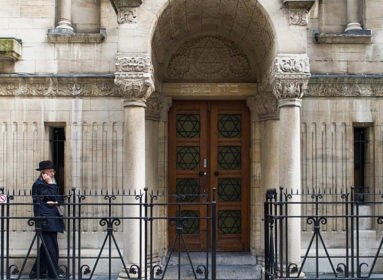
In discovering the truth about the death of his airman uncle during World War II, a West Hartford man learns a lesson about human kindness
By Cindy Mindell
For his entire adult life, George Levine has been trying to understand what happened to his uncle and namesake, American airman Samuel Joseph “George” Levine, during World War II.
On the other side of the war, Leopold Jetzinger has been seeking the truth about his uncle, Arthur Jetzinger, a German soldier whose wartime activity was always shrouded in mystery.
In May, a documentary filmmaker gave both men the answers they had been seeking for decades.
That’s when George Levine’s sister, Lauren “Laurie” Diefenbach, was contacted by Ohio-based historian Marilyn Jeffers Walton. The researcher was working with German historian Dr. Susanne Meinl and filmmaker Nils Werner to locate descendants of Samuel Levine and his two fellow crew members, whose plane had been shot down in northeastern Germany in 1944.
George, who is a resident of West Hartford, and Laurie are natives of Springfield, Mass., where their grandparents, Louis and Ida Levine, had raised four children: Samuel Joseph “George” (1922-1944); Max (1923-2007); George and Laurie’s father, Theodore, “Ted,” (1925-2007); and Esther (1934-2015).
On July 7, 1944, Second Lieutenant Samuel Joseph “George” Levine, Sergeant John M. Chojecki, and Sergeant Walter F. Dinsmore, members of the United States Air Force, were shot down near Junkers Airbase in Bernberg, Germany. The official story relayed to the Levine family was that, after safely parachuting to the ground, George had been shot and killed by a rogue German farmer, Jacob Kemf, from the village of Kleinzerbst.
“We grew up with this sad legacy that my uncle died in the war, but we didn’t know much more than that,” says George, 59, who lives in West Hartford. “The vague vision that the family had was George landing in a field, being discovered by the German farmer, and killed as a matter of self-defense. But as I got older, I had the feeling that it wasn’t an accident, it wasn’t some German farmer protecting his turf.”
The death hit the Levine family hard, especially Ted, who was 19 at the time. In his memoir, The Day Our World was Shattered, Ted wrote about learning of his older brother’s death: “After the war, Kemf was arrested and stood trial for this killing. I don’t know what punishment he received. Who knows what personal losses he endured? Any punishment that he received did not help to return my brother to us. George was awarded an Air Medal and a Purple Heart posthumously.”
From then on, Ted carried in his wallet a slip of paper bearing the name of “George’s assassin” and the location of the murder. Ted passed away in 2007, before learning the entire truth about his older brother.
What he didn’t know, and what the Levine family was never told, was that the U.S. Army Courts in Europe tried the three German police officers after the war. The report of the General Military Government Court at Ludwigsburg, determining the action a war crime, reads, “On orders of Dessau Kripo [Police] chief, Arthur Jetzinger, the accused collected three American airmen, who were in the custody of the burgomeister of Hohen-Erxleben or Gerwitz, and shot them in the woods near Kleinzerbst.”Fritz and Vogler were sentenced to death for the crime. Levine’s killer, Kemf, went free. The trial is documented in the 2004 book, The Dachau Defendants: Life Stories from Testimony and Documents of the War Crimes Prosecutions by Fern Overbey Hilton.
The key to the mystery was held by Leopold Jetzinger, 85, who earlier this year was watching “The Trail of Ancestors – Every Family Has a Secret,” a genealogy series produced by Central German Broadcasting TV. Each episode concludes with an appeal to viewers to submit their own family mysteries for a future segment. Jetzinger contacted the station, wanting to learn about his uncle, Arthur Jetzinger. His mystery is described on the Central German Broadcasting website:
“As a child, Leopold Jetzinger was more than impressed by his uncle Arthur. He had a very charismatic appearance and was a criminal police officer in Dessau. He was also sent to Paris in 1942 for a ‘secret’ mission … the perfect matrix for the imagination of a small boy. But after the war, the uncle came to hide for a few days with his brother, Leopold’s father, and then completely disappeared. What had happened during the Nazi era?”
Jetzinger worked with filmmaker Nils Werner and Dr. Susanne Meinl, a Munich-based historian who specializes in researching and paying tribute to downed Allied airmen who bailed out over Germany, many of whom were mistreated by the Gestapo or civilians on the ground.
Meinl consulted with Ohio-based historian Marilyn Jeffers Walton for help locating family members of the three airmen. In 2004, Walton had retraced her father’s wartime footsteps from England to Germany, locating the crash site of his B-24 bomber, which was nicknamed “Rhapsody in Junk.”
“Pieces of it were still in the woods, and with the help of the local Germans, I was able to dig some pieces out of the woods to bring home to him to place in his hands two weeks before he died,” says Walton, who also met the woman who watched him bail out of the plane.
The research for her book on the incident, Rhapsody in Junk, led to requests from friends who wanted to learn the stories of their own fathers’ wartime experiences.
“I found it very gratifying to locate useful information for those who did not know where to start,” Walton says. “So many did not have a clue what their fathers did in the war, as the men were so humble when they returned after the war and got on with their lives, never feeling they were heroes, but men who were just ‘doing their jobs.’”
Walton has developed a network of fellow World War II researchers and historians around the world. She was introduced via email to Meinl, who contacted Walton to ask for help in locating descendants of the three American airmen, providing Laurie’s name and profession. Walton took it from there.
“It used to be you could easily get phone numbers online, but that has become more difficult, so you have to get more creative, searching for relatives, searching for obituaries, searching cemetery websites, names of others who might have known someone on the crew, etc.,” Walton says. “And sometimes you just get lucky!”
Walton corresponded with Laurie and George, who sent her photos of their uncle.
“When I put a face to a name for someone whose history I am tracing, it all becomes much more poignant,” she says. “I look into the eyes of a man lost far too early in his life, who had a family that mourned him for years, the son of a mother and father who were never the same. And so often, the family members know so little of the circumstances of the loss. I always ask them how much they know and how much they would like to know if possible. Even after all these years, in some cases, it is better to leave some things unsaid.”
Walton and Meinl were unable to locate family members of the other two airmen.
During the filming, Jetzinger, Meinl, and Werner visited Kleinzerbst, the village where the shootings had taken place. The mayor went door to door to gather information from residents who could shed light on the incident. The visitors stopped in the village cemetery, where the three airmen had been buried for a year. After the war, Samuel Levine was reinterred next to his parents in the Sons of Israel cemetery in Springfield, Mass.
The Jetzinger episode was broadcast in June, and the Levine family finally had the full story about Samuel: Arthur Jetzinger ordered German police officers Fritz Pohla, Jacob Kemf, and Ernst Vogler to kill the three American airmen who had parachuted into a field near Dessau, Germany, instead of taking them prisoner.
After the broadcast, Meinl suggested to the mayor of Kleinzerbst that a memorial in tribute to the three airmen be erected in the cemetery. The mayor collected money for a plaque, which will be dedicated in a public ceremony on Nov. 12. Meinl composed the inscription:
IN MEMORIAM
JOHN M. CHOJECKI * 1919 ILLINOIS
WALTER F. DINSMORE * 1919 PENNSYLVANIA
SAMUEL J. LEVINE * 1921 MASSACHUSETTS
U.S. ARMY AIR FORCE
ERMORDET AM 7. JULI 1944 BEI KLEINZERBST.
IHR TOD MAHNT UNS ZU FRIEDEN
UND VERSÖHNUNG.
Murdered on 7 July 1944 near Kleinzerbst
Their death warns us of peace and reconciliation

At a conference on teaching history, Arthur Jetzinger’s nephew, Leopold Jetzinger, talked about the time of national socialism in his Thuringian homeland of Mühlhausen.
The Levine family will not attend the ceremony, but prepared a statement that Meinl will read to the attendees. It states, in part, “The Levine family is eternally grateful to the makers of this courageous film, including Leopold Jetzinger. We are aware that many German citizens, like Mr. Jetzinger, are coming to grips with previous generations’ participation in World War II, Nazi crimes, and the Holocaust. In particular, we are thankful for this ceremony honoring Levine and the two other victims that is being held at the site of the killing in Kleinzerbst, Germany… That the truth has finally come to light is comforting for the Levine family. We think it is important for the world to understand that the German practice of airmen lynching, while a sad chapter during the end of World War II, did occur and caused significant pain in the USA for the Gold Star families, survivors of war deaths.
… We are comforted by the hard work of Mr. Werner and Ms. Meinl in Germany, and consider them true heroes. We understand the years that Ms. Meinl has devoted to understanding this practice, and revealing the truth to the surviving family.”
For George Levine, the experience has been transformative.
“I grew up not liking Germans because of the Holocaust; they’re nobody you want to get to know and they’re all evil,” he says. “The fact that we got a call from normal German people saying that Germans are looking into their background about the Holocaust and not letting former Nazis off the hook was life-changing for me. Something happened so many miles away and you think that this was an event that came and went and that nobody thought about it. You come to these conclusions and you’re just dead wrong: these people in Germany really care about this stuff. My opinion of Germans has radically changed.”
Meinl is working on a book and exhibition on the wartime “lynchings” of Allied airmen, and has helped other American families learn the fate of their relatives killed during the war. “It is such a healing experience for all of us,” she says.
The research process proved challenging for Leopold Jetzinger.
“It was a very hard thing for him to do, to stand in front of a camera and talk about his family story,” Meinl says. “The history was a burden to him. On one side he is happy that he got to learn what really happened, but on the other side, he has to live with that. I admire him for his honest behavior.”
George and Leopold have exchanged letters. Meinl hopes that the two get a chance to meet. “I deeply believe in bringing things to an end, closing the circle,” she says. “Maybe it takes 70 years. A lot of these stories are coming out now. People were young – 10, 12, 15 – when they saw lynchings of Allied airmen. There were liquidations out in the open and in a lot of these cases, everybody would join in, throwing stones and beating with sticks, screaming, ‘Kill him!’ This dark history stayed in their consciousness and it was very difficult to discuss it because of National Socialist propaganda. They come to the last years of their lives and they want to talk about it.”
The Levine family’s statement concludes on a philosophical note.
“The lessons are there; sometimes it takes a long time to learn the truth, and that sometimes what one believes is a private, painful issue is often being experienced by others. Forgiveness, kindness and patience are all healers.”








 Southern New England Jewish Ledger
Southern New England Jewish Ledger












